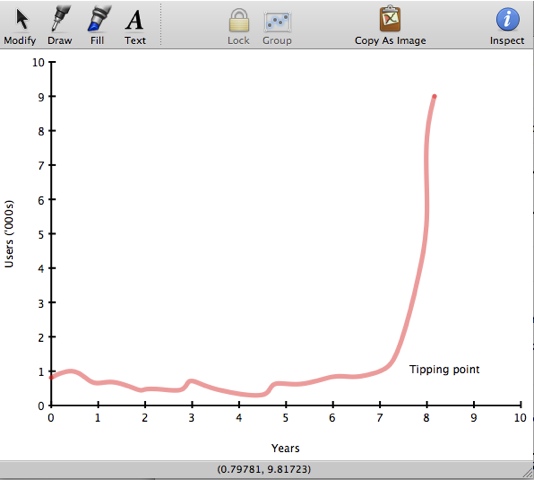John Nagl has published a very perceptive review of Jonathan Stevenson’s book Thinking Beyond the Unthinkable: Harnessing Doom from the Cold War to the Age of Terror in which he contrasts the feeble resources currently devoted to thinking about countering the Al-Qaeda threat with the resources mustered by the US to ponder nuclear strategy in the Cold War. It’s easy now to ridicule the Dr Strangelove aspects of the doctrine of Mutual Assured Destruction, but the fact is that a great deal of deep thinking went into formulating a strategy for dealing with the threat of nuclear war. (And, btw, it also got us the Internet.)
Nagl’s (and Stevenson’s) point is that nothing comparable is going on in relation to the so-called ‘war’ on terror.
There are thousands of years of history to support the contention that deterrence works against states, and while the ruler of Iraq may have been a very bad man, there is little to suggest that he was anything but a rational political actor. Even if Saddam Hussein had gained control of nuclear weapons, self-preservation would have precluded him from using them, just as it had prevented a succession of Soviet leaders from unleashing this horseman of the apocalypse. Meanwhile, the risk that his proliferation would have been discovered and punished would have deterred him from giving nuclear weapons to sub-state actors, who had no territory at risk. September 11 did not, in fact, change everything, and one of the things that it did not change was the fact that states can be deterred.
Non-state actors, however, cannot be deterred so easily. Stevenson gets to this point about two-thirds of the way through Thinking Beyond the Unthinkable, and this is where the book begins to plow fertile new ground. The process by which Al Qaeda made the decision to attack the World Trade Center and the Pentagon is instructive:
“Al-Qaeda’s shura, or council, sharply debated whether the shock of attacking the World Trade Center and the Pentagon would be worth the probable loss of Afghanistan as a base, and ultimately was persuaded that it was. So the threat of devastating retaliation against territory that had proven so reliable a deterrent during the Cold war was unavailing against al-Qaeda’s most powerful leaders. They seemed to view not only the destruction of September 11 but also the robust U.S. response as a catalyst to a self-perpetuating and intensifying jihad that would somehow realize the group’s violent eschatological vision of an America destroyed. In that light, any feasible punishment administered by the United States was not merely futile but, in fact, inspiring to the jihadists.”
We now face enemies who not only are unconcerned that the fruit of their labors will be the destruction of everything they hold dear, but are absolutely gleeful at the idea. This is a new challenge, and not one which Kahn and Wohlstetter can help us with very much.
Nagl builds on this to say:
The challenge of radical Islam is not something to which the United States devoted much thought as it grew stronger, encouraged by a reaction to globalization and by some of our own foreign policy decisions. In a judgment some readers will likely take personally but is almost certainly true, former RAND President Harry Rowen said that before September 11, “The scholars of Islam available in the West–certainly in the United States–were a pretty sorry lot.” They did not, by and large, see this one coming.
Stevenson proposes creating a Federally Funded Research and Development Corporation, or FFRDC, dedicated to thinking about the Islamic terror threat in the same way that RAND thought about the Soviet nuclear threat. Stevenson suggests the Defense Advanced Research Projects Agency (DARPA) as a model.
Commenting on this, Nagl writes:
It is undeniably a good and long-overdue idea, with likely payoffs hugely exceeding the few hundred million dollars such an organization would cost the taxpayer every year. But beyond the basics, Stevenson is working from the wrong mould. RAND was so influential not least because it was the brains behind an enormously large and powerful set of muscles called the Strategic Air Command, where peace was a profession and war just a hobby; DARPA provides thinking that feeds the mammoth U.S. defense industry. Stevenson’s proposed think tank would need similar need bone and muscle. But unlike the Strategic Air Command or the Department of Defense, the muscle we need today would motivate soft power, rather than hard steel.
If the Bush regime had been really serious about it’s concept of a ‘war’ on terror, then they would have mobilised all the elements of U.S. national power — including the nation’s collective IQ. A moment’s reflection — or even a conversation with Philip Bobbitt — would have told them that they needed to address not just the intellectual dimensions of the problem but also the fundamental inadequacy of an international law of war designed to govern the conduct of war between states rather than the challenge of non-State actors.
A better policy therefore, Nagl argues,
would be an international conference leading to an updated Geneva Accords, focusing on state sponsors of terrorism. It would hold that any state that actively or passively enabled terrorist organizations acting on its soil would share responsibility for the terrorist activity, to include financial liability; states could also be held responsible for control of fissile material produced inside their borders. Because deterrence is a function of both capability to punish and credibility that threats will be fulfilled, an international consensus on state responsibility for terror would be far more useful than threats to attack Islam’s holy cities, without the added negative second-order effect of inspiring additional jihadis to fight us to defend them.
Great stuff.

